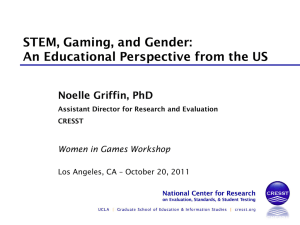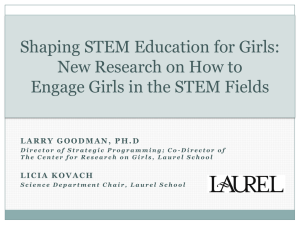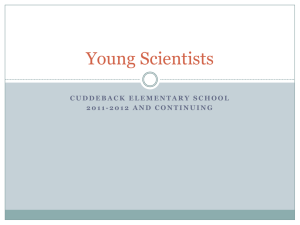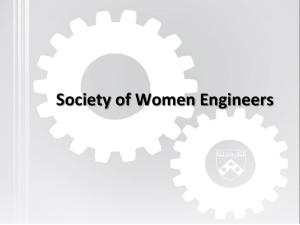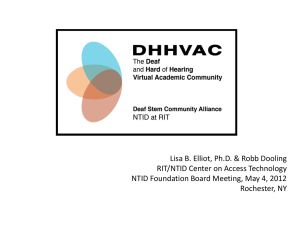Then Now
advertisement
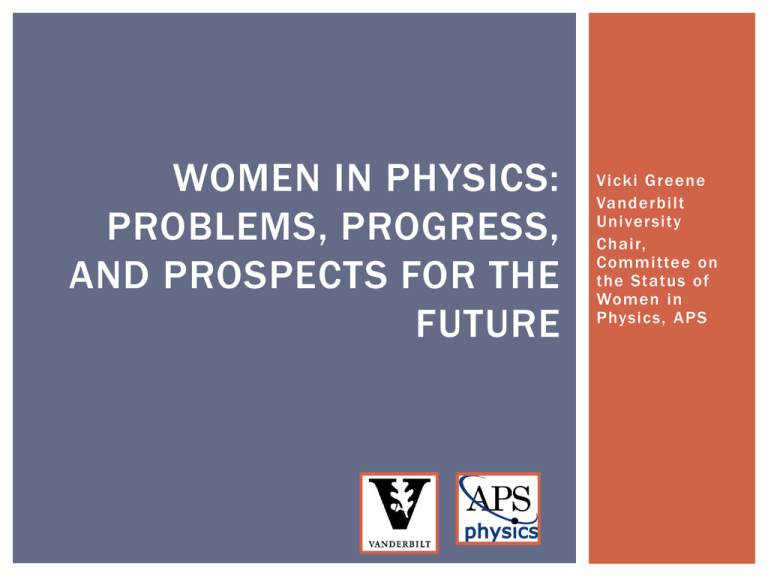
WOMEN IN PHYSICS: PROBLEMS, PROGRESS, AND PROSPECTS FOR THE FUTURE Vicki Greene Vanderbilt Univer sity Chair, Committee on the Status of Women in Physics, APS OUTLINE Introduction Disclaimers Problems Current participation of women in physics When do we decide Progress The pipeline Why not more girls? Is everything rosy? Then & Now Issues & strategies Prospects for the Future More strategies CSWP PERCENTAGE OF BACHELOR’S DEGREES IN PHYSICS AWARDED TO WOMEN PROBLEMS PROGRESS WHAT ABOUT THE PIPELINE? BEHOLD THE SCISSORS GIRLS AREN’T GOOD AT MATH? GIRLS AREN’T INTERESTED IN SCIENCE? GIRLS AREN’T GOOD AT SPATIAL RELATIONS? GIRLS PREFER SOCIAL ACTIVITIES? WHAT ELSE? Other “explanations” Women play dumb to impress men Women choose families over career Women aren’t willing to make the necessary sacrifices And some real concerns: Problem sets Imposter syndrome Perception of own abilities/ effect of low grades IN MATH AND SCIENCE, A GROWTH MINDSET BENEFITS GIRLS . Fixed Mindset Growth Mindset Intelligence is static. Intelligence can be developed. Leads to a desire to look smart and therefore a tendency to Leads to a desire to learn and therefore a tendency to • avoid challenges • embrace challenges Praise children for effort. • give up easily due to obstacles • persist despite obstacles Highlight the struggle. • see effort as fruitless • see effort as path to mastery • ignore useful feedback • learn from criticism • be threatened by others’ success • be inspired by others’ success Teach children that intellectual skills can be acquired. Gifted and talented programs should send the message that they value growth and learning. PERCENT OF BACHELOR’S DEGREES AWARDED TO WOMEN BY FIELD PERCENT OF PH.D’S EARNED BY WOMEN BY FIELD SO IS EVERYTHING ROSY? THEN AND NOW Woman graduate student told she should follow her husband’s postdoc career regardless of her own prospects. Faculty candidate heard that at an interview for a faculty position, she was dressed too attractively and would be a poor role model for the women graduate students. Male graduate students have a computer printout of a nude woman’s body posted on the wall of the lab. Woman graduate student told by professor that she should find a husband and have a family. Attractive woman interviews for faculty position. Chair of committee questions whether she is a serious scientist. Male graduate students keeps a replica of a woman’s breast on his desk at work. SOME REALITIES POSSIBLY NOT A PROBLEM ANY LONGER Bias in peer-review Greater expectations for publication Less likely to get credit for work Less likely to get grant approved OTHER CONCERNS Uneven distribution of resources and its effect on productivity More likely to be contingent faculty Balancing career and family Know that many other women have faced these challenges successfully! Remember the scissors. PROSPECTS FOR THE FUTURE POSITIVE STRATEGIES Focus on outcomes Choose your battles Be resilient Learn how and when to negotiate Watch out for the water cooler gang Work ef ficiently Choose service work wisely – use a mix of strategy and passion Keep your c.v. up-to-date Learn how to give yourself permission Trust your instincts and follow your interests Know that senior people usually love to talk to their junior colleagues COMMITTEE ON THE STATUS OF WOMEN IN PHYSICS CSWP is a very active committee of the American Physical Society Activities at APS meetings: Networking events Invited sessions Professional skills development Other activities Site visits Woman Physicist of the Month Mari-Goeppert-Meyer Award Blewett Fellowship Gazette newsletter Online Women in Physics on LinkedIn CENTER FOR STEM EDUCATION FOR GIRLS The Center for STEM Education for Girls at Harpeth Hall School in Nashville will accomplish the following : Create STEM for Girls Consortium of K -12 and university educational leaders, community leaders, and business leaders that will meet annually to discuss best practices for STEM education for girls at both the secondary and university levels. Initiate and host a summer STEM for Girls Conference for educators, providing teachers with hands-on workshops. Develop a replicable summer STEM Institute for Girls, which will offer intensive experiences in STEM fields for girls primarily from non magnet public schools and charter schools entering 9th and 10th grades in Middle Tennessee schools. REFERENCES American Institute of Physics Statistical Research Center www.aip.org/statistics Why so Few? Women in Science, Technology, Engineering, and Mathematics, AAUW NSF Division of Science Resources Statistics American Physical Society Committee on the Status of Women in Physics Women’s representation among STEM doctorates has also increased dramatically over time, although it varies by field. Doctorates Earned by Women in Selected STEM Fields, 1966–2006 Source: National Science Foundation, Division of Science Resources Statistics, 2008, Science and engineering degrees: 1966–2006 (Detailed Statistical Tables) (NSF 08-321) (Arlington, VA), Table 25, Author's analysis of Tables 34, 35, 38, & 39. Women are less likely than men are to declare a STEM major in college. Intent of First-Year College Students to Major in Science and Engineering Fields, by Gender, 2006 Physical sciences Mathematics/ statistics Engineering Computer sciences Biological/ agricultural sciences 35 Percentage 30 25 20 15 10 5 0 Female Male Source: Commission on Professionals in Science and Technology. Data derived from Cooperative Institutional Research Program, Higher Education Research Institute, Graduate School of Education and Information Studies, University of California, Los Angeles, The American Freshman: National Norms for Fall 1990 through Fall 2006, www.gseis.ucla.edu/heri/heri.htm. Women’s representation among STEM bachelor’s degree holders has improved over time but varies by field. Bachelor’s Degrees Earned by Women in Selected Fields, 1966–2006 Source: National Science Foundation, Division of Science Resources Statistics, 2008, Science and engineering degrees: 1966–2006 (Detailed Statistical Tables) (NSF 08-321) (Arlington, VA), Table 11, Author's analysis of Tables 34, 35, 38, & 39.

